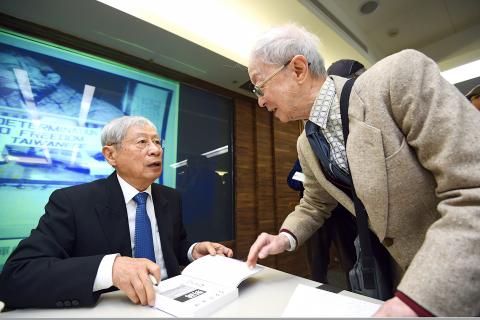The government should demolish any memorials that are reminiscent of the Chinese Nationalist Party’s (KMT) past autocracy, including the Chiang Kai-shek (蔣介石) Memorial Hall in Taipei, Taiwanese architect Cheng Tzu-tsai (鄭自才) said yesterday at a book launch in Taipei.
Cheng introduced his memoir about the failed assassination of then-deputy premier Chiang Ching-kuo (蔣經國) in New York on April 24, 1970, while the pan-blue camp was commemorating the 30th anniversary of Chiang’s death at a separate event yesterday.
The assassination attempt was planned and executed by Huang Wen-hsiung (黃文雄), who is Cheng’s brother-in-law, with Cheng as a collaborator.

Photo: Chien Jung-fong, Taipei Times
However, the attempt failed and the two were detained by police on the spot.
“As the assassination attempt took place about 50 years ago, many people nowadays do not know about it,” Cheng said. “Hopefully, this book can help expedite the nation’s realization of transitional justice.”
The memoir, titled To Kill a Dictator: The Attempted Assassination of Chiang Ching-kuo, was coauthored by Cheng and Alliance for Justice in Educational Transformation secretary-general Chang Wen-lung (張文隆).
The authors discuss vignettes in Taiwanese history from 1936 to 1974, including Taiwanese independence movements in the US, the assassination plan, Cheng’s imprisonment in the US and the UK, and his political asylum in Sweden.
Cheng’s memoir ends when he was released on parole from a US prison on Nov. 25, 1974, and left for Sweden to be reunited with his family.
“The perpetrators of political crimes during the White Terror era should undergo legal trials and punishment,” Cheng said.
“The Chiangs’ ghosts linger in Taiwanese society,” which is why former president Ma Ying-jeou (馬英九) and others still worship them, he said.
“The nation cannot become truly free and democratic if its transitional justice is not realized,” he said, calling on the government to demolish the Chiang Kai-shek Memorial Hall and other symbols of the KMT’s dictatorship.
By introducing the endeavors of Huang and Cheng, Chang said he hopes the book could incite desire to fight for Taiwanese independence.
Documentation about Taiwanese history has largely been based on KMT propaganda that supports a “one China” principle, while the nation needs more historical texts that reflect the truth, said US political activist Linda Gail Arrigo, who was the English-language translator of the book summary.

DAREDEVIL: Honnold said it had always been a dream of his to climb Taipei 101, while a Netflix producer said the skyscraper was ‘a real icon of this country’ US climber Alex Honnold yesterday took on Taiwan’s tallest building, becoming the first person to scale Taipei 101 without a rope, harness or safety net. Hundreds of spectators gathered at the base of the 101-story skyscraper to watch Honnold, 40, embark on his daredevil feat, which was also broadcast live on Netflix. Dressed in a red T-shirt and yellow custom-made climbing shoes, Honnold swiftly moved up the southeast face of the glass and steel building. At one point, he stepped onto a platform midway up to wave down at fans and onlookers who were taking photos. People watching from inside

A Vietnamese migrant worker yesterday won NT$12 million (US$379,627) on a Lunar New Year scratch card in Kaohsiung as part of Taiwan Lottery Co’s (台灣彩券) “NT$12 Million Grand Fortune” (1200萬大吉利) game. The man was the first top-prize winner of the new game launched on Jan. 6 to mark the Lunar New Year. Three Vietnamese migrant workers visited a Taiwan Lottery shop on Xinyue Street in Kaohsiung’s Gangshan District (崗山), a store representative said. The player bought multiple tickets and, after winning nothing, held the final lottery ticket in one hand and rubbed the store’s statue of the Maitreya Buddha’s belly with the other,

‘NATO-PLUS’: ‘Our strategic partners in the Indo-Pacific are facing increasing aggression by the Chinese Communist Party,’ US Representative Rob Wittman said The US House of Representatives on Monday released its version of the Consolidated Appropriations Act, which includes US$1.15 billion to support security cooperation with Taiwan. The omnibus act, covering US$1.2 trillion of spending, allocates US$1 billion for the Taiwan Security Cooperation Initiative, as well as US$150 million for the replacement of defense articles and reimbursement of defense services provided to Taiwan. The fund allocations were based on the US National Defense Authorization Act for fiscal 2026 that was passed by the US Congress last month and authorized up to US$1 billion to the US Defense Security Cooperation Agency in support of the

‘COMMITTED TO DETERRENCE’: Washington would stand by its allies, but it can only help as much as countries help themselves, Raymond Greene said The US is committed to deterrence in the first island chain, but it should not bear the burden alone, as “freedom is not free,” American Institute in Taiwan Director Raymond Greene said in a speech at the Institute for National Defense and Security Research’s “Strengthening Resilience: Defense as the Engine of Development” seminar in Taipei yesterday. In the speech, titled “Investing Together and a Secure and Prosperous Future,” Greene highlighted the contributions of US President Donald Trump’s administration to Taiwan’s defense efforts, including the establishment of supply chains for drones and autonomous systems, offers of security assistance and the expansion of